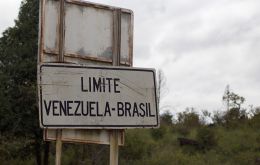MercoPress. South Atlantic News Agency
Brazil
-
Saturday, June 26th 2021 - 09:45 UTC
Brazil eases entry restrictions on entry to Venezuelan migrants through Roraima land crossing

Brazil's Federal Government has allowed international land border crossings to and from Venezuela for residents of adjacent cities who shall be required to produce a borderline resident ID card, according to a new measure published on the Official Gazette Friday.
-
Thursday, June 24th 2021 - 09:27 UTC
New coronavirus variant discovered by Brazilian scientists in Rio de Janeiro

Brazilian scientists Wednesday claimed to have found a new variant of the SARS-Cov-2 virus in Rio de Janeiro, which they named P5 but is yet to be recognized worldwide.
-
Wednesday, June 23rd 2021 - 08:59 UTC
Brazilian Government announces increased funding for agribusiness

The Government of Brazilian President Jair Bolsonaro Tuesday launched what was called “The Harvest Plan 2021/2022” for which funding worth R$ 251.2 billion (US $ 50.6 billion) for national agribusiness was allocated.
-
Tuesday, June 22nd 2021 - 09:49 UTC
Former Brazil President Lula Da Silva acquitted in yet another corruption case

Former Brazilian President Luiz Inácio Lula da Silva was acquitted due to lack of evidence Monday in one of the corruption cases for which he was being tried, it was announced.
-
Tuesday, June 22nd 2021 - 09:45 UTC
Bolsonaro lashes out at Brazil media giant Globo for its “journalists who do not help at all” regarding covid-19

Brazilian President Jair Bolsonaro Monday lashed out at national media giant Globo for its stance on covid-19, which differs completely from what the Government calls “an early treatment,” a cocktail made up of controversial drugs such as chloroquine.
-
Monday, June 21st 2021 - 09:14 UTC
Copa America: Chile players skip health bubble in major scandal

A Brazilian stylist broke through the Chilean squad's health bubble and players uploaded to social media photographs of them having their hair cut in Cuiabá in what has been so far the biggest scandal at the Copa America football tournament where over 60 cases of covid-19 have so far been detected.
-
Monday, June 21st 2021 - 09:05 UTC
Brazilian opposition rallies nationwide seeking Bolsonaro's resignation and more vaccines

Scores of Brazilians took to the streets at different cities nationwide Sunday to express themselves against President Jair Bolsonaro handling the coronavirus pandemic and asking for his resignation.
-
Monday, June 21st 2021 - 08:53 UTC
Anvisa green-lights sale of 480 tons of medical oxygen to Paraguay

Paraguay's Foreign Ministry Sunday confirmed Brazil's National Health Surveillance Agency (Anvisa) had agreed to allow the sale of 480 tons of oxygen for medical purposes.
-
Saturday, June 19th 2021 - 14:09 UTC
Brazil: Henrique Cardoso turns 90 and thinks tomorrow “could be better than today”

Former Brazilian President Fernando Henrique Cardoso (FHC) defended the alliance of political forces to oppose authoritarianism in a newspaper interview marking his 90th birthday, Friday, June 18.
-
Friday, June 18th 2021 - 09:52 UTC
Brazilians flock into Portugal for the fourth straight year

The arrival of Brazilian migrants into Portugal has reached new levels for the fourth consecutive year even despite the coronavirus pandemic restrictions.
